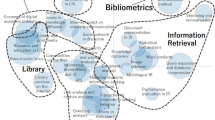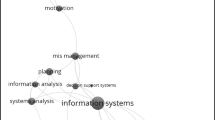Abstract
The terminological composition of information management (IM) and knowledge management (KM) is described in order to evidence how much do these areas overlap within the library and information sciences (LIS) space. A term co-occurrence analysis is conducted as from documents extracted from Web of Science, covering the period 1980–2015. To examine the terminological (di) similarity two approaches are applied: ‘overlay visualizationʼ and ‘topic detectionʼ. The percentage of terminological similarity oscillates between 24% and 38% according to the ‘overlay visualizationʼ and ‘topic detectionʼ techniques. At the core of the terminological intersection between IM and KM lies the study around processes, technologies and information systems. However, they are semantically two separate areas that tend to address similar dimensions -such as the managerial, educational and medical, but emphasizing different approach. Moreover, IM refers to the library and information organizations, highlighting the focus on personal information management, human information behavior, health information management, and information resource management. Oppositely, KM highlights the business, management and accounting realms in which topics like knowledge sharing and social networks, knowledge management strategies, and knowledge management projects are prevailing. These results would help to (re) define curricular contents of LIS programs as well as research and practical activities conducted by academicians and managers. This is the most comprehensive quantitative study in examining the epistemic borders between IM and KM in the LIS research. The authors consider that the methodological procedures here employed might be suitable to understand the boundaries between similar fields.




Similar content being viewed by others
References
Schlögl, C. (2005). “Information and knowledge management: dimensions and approaches”, Information Research, Vol. 10 No. 4, paper 235, available at: http://InformationR.net/ir/10-4/paper235.html (Accessed 15 May 2018)
Prabha Singh S (2007) What are we managing–knowledge or information? Vine 37(2):169–179
Kruger CN, Johnson RD (2010) Information management as an enabler of knowledge management maturity: a south African perspective. Int J Inf Manag 30(1):57–67
Amorim FB, Tomaél MI (2011) Gestão da informação e gestão do conhecimento na prática organizacional: análise de estudos de casos. RDBCI: Revista Digital de Biblioteconomia e Ciência da Informação 8(2):1–22
Edelman F (1981) The management of information resources-A challenge for American business. MIS Q 5(1):17–27
Trauth EM (1989) The evolution of information resource management. Inf Manag 16(5):257–268
Vreeken A (2005) The history of information: lessons for information management, Sprouts: Working Papers on Information Systems, 5(2), available at: http://sprouts.aisnet.org/5-2 (Accessed 2 April 2018)
Wright A (2007) Glut: mastering information through the ages. Joseph Henry Press, Washington, DC
Wiig KM (2000) Knowledge management: an emerging discipline rooted in a long history. In: Despres C, Chauvel D (eds) Knowledge horizons: the present and the promise of knowledge management. Butterworth-Heinemann, Oxford
Prusak L (2001) Where did knowledge management come from? IBM Syst J 40(4):1002–1007
McInerney CR, Day RE (2007) Rethinking knowledge management: from knowledge objects to knowledge processes. Springer-Verlag, Berlin Heidelberg
Black A (1999) Information management in business, libraries and British military intelligence: towards a history of information management. J Doc 55(4):361–374
Wiig KM (1997) Knowledge management: where did it come from and where will it go? Expert Syst Appl 13(1):1–14
Davenport TH, Marchand D (1999) Is KM just good information management? The Financial Times Mastering Series: Mastering Information Management, pp. 2–3
Day RE (2001) Totality and representation: a history of knowledge management through European documentation, critical modernity, and post-Fordism. J Assoc Inf Sci Technol 52(9):725–735
Benedon W (2010) History of records and information management. In: Encyclopedia of Library and Information Sciences, 3rd edn. Taylor and Francis, New York
Horton FW, Marchand DA (1982) Information management in public administration. Information Resources Press
Lambe P (2011) The unacknowledged parentage of knowledge management. J Knowl Manag 15(2):175–197
Davenport E, Cronin B (2000) Knowledge management: semantic drift or conceptual shift? J Educ Libr Inf Sci 41(4):294–306
Gold AH, Malhotra A, Segars AH (2001) Knowledge management: an organizational capabilities perspective. J Manag Inf Syst 18(1):185–214
Blair DC (2002) Knowledge management: hype, hope, or help? J Am Soc Inf Sci Technol 53(12):1019–1028
Fernández Marcial V (2006) Gestión del conocimiento versus gestión de la información. Investigación bibliotecológica 20(41):44–62
Barbosa RR (2008) Gestão da informação e do conhecimento: origens, polêmicas e perspectivas. Informação & Informação 13(1):1–25
Middleton M (1999) From information management to knowledge management: some perspectives on development. El Profesional de la Información 8(5):10–17
Chen XH, Snyman MMM, Sewdass N (2005) Interrelationship between document management, information management and knowledge management, South African Journal of Information Management, 7(3), available at: http://hdl.handle.net/10520/AJA1560683X_166 (Accessed 18 May 2018)
Al-Hawamdeh S (2002) Knowledge management: re-thinking information management and facing the challenge of managing tacit knowledge. Info Res, 8(1), paper no. 143, available at: http://InformationR.net/ir/8-1/paper143.html (Accessed 15 May 2018)
Giaglis G (2002) European research on knowledge and information management: current status and future prospects, In Proceedings of the 2nd International Conference on Systems Thinking in Management, Salford, UK, pp. 3–5
Miller F, Wallis J (2011) Social interaction and the role of empathy in information and knowledge management: a literature review. J Educ Libr Inf Sci 52(2):122–132
Świgoń M (2013) Personal knowledge and information management–conception and exemplification. J Inf Sci 39(6):832–845
de Souza ED, Dias EJW, Nassif ME (2011) A gestão da informação e do conhecimento na ciência da informação: perspectivas teóricas e práticas organizacionais. Informação & Sociedade: Estudos 21(1):55–70
Risso VG (2012) Aproximación teórica a la relación entre los términos gestión documental, gestión de información y gestión del conocimiento. Revista Española de Documentación Científica 35(4):531–554
Wilson TD (2002) The nonsense of 'knowledge management. Inf Res, 8(1), available at: http://InformationR.net/ir/8-1/paper144.html (Accessed 18 May 2018)
Hjørland B (2012) Knowledge organization=information organization? Advances in Knowledge Organization 3:8–14
Bates MJ (2005) Information and knowledge: an evolutionary framework for information science. Info Res, 10(4), paper 239, available at http://InformationR.net/ir/10-4/paper239.html (Accessed 15 May 2018)
Mortaza K, Gholamreza H, Shirazi SM (2015) Bibliographic comparison of information management and knowledge management fields through their scientific outputs with emphasis on the share of information science in each of these fields. Iranian Journal of Information Processing and Management 30(2):397–417
Bouthillier F, Shearer K (2002) Understanding knowledge management and information management: the need for an empirical perspective. Info Res, 8(1), paper no. 141, available at: http://InformationR.net/ir/8-1/paper141.html (Accessed 13 August 2018)
Callon M, Courtial JP, Turner WA, Bauin S (1983) From translations to problematic networks: an introduction to co-word analysis. Soc Sci Inf 22(2):191–235
He Q (1999) Knowledge discovery through co-word analysis. Libr Trends 48(1):133–159
Braam RR, Moed HF, Van Raan AF (1991) Mapping of science by combined co-citation and word analysis I. Structural aspects. J Am Soc Inf Sci 42(4):233–251
Law J, Bauin S, Courtial J, Whittaker J (1988) Policy and the mapping of scientific change: a co-word analysis of research into environmental acidification. Scientometrics 14(3–4):251–264
Whittaker J (1989) Creativity and conformity in science: titles, keywords and co-word analysis. Soc Stud Sci 19(3):473–496
Noyons EC, van Raan AF (1998) Monitoring scientific developments from a dynamic perspective: self-organized structuring to map neural network research. J Am Soc Inf Sci 49(1):68–81
Noyons ECM (1999) Bibliometric mapping as a science policy and research management tool. In: Leiden University. DSWO Press, The Netherlands
Leydesdorff L, Welbers K (2011) The semantic mapping of words and co-words in contexts. Journal of Informetrics 5(3):469–475
van Eck NJ, Waltman L, Noyons ECM, Buter RK (2010a) Automatic term identification for bibliometric mapping. Scientometrics 82(3):581–596
Nordstrom LO (1990) “Bradford’s law” and the relationship between ecology and biogeography. Scientometrics 18(3–4):193–203
Borgman CL, Rice RE (1992) The convergence of information science and communication: a bibliometric analysis. J Am Soc Inf Sci Technol 43(6):397–411
Ellis D, Allen D, Wilson T (1999) Information science and information systems: conjunct subjects disjunct disciplines. J Assoc Inf Sci Technol 50(12):1095–1107
Gu Y (2004) Information management or knowledge management? An informetric view of the dynamics of academia. Scientometrics 61(3):285–299
Jabr NH, Kallow SM (2010) Exploring integrity among information management and knowledge management within the multidisciplinary, interdisciplinary, and disciplinary environment. Information Studies 7:1–21
Ahmadi H, Kokabi M (2015) Co-word analysis: a study on the links and boundaries between information and knowledge management according to Iranian press authors. Iranian Journal of Information Processing and Management 30(3):647–676
Onyancha, O.B. (2011) How is “knowledge management” similar to or different from “information management”? An informetrics perspective, In E. Noyons; P. Ngulube and J. Leta (Eds.), Proceedings of the International Conference on Scientometrics and Informetrics, Durban, South Africa (pp. 626–637)
van Eck NJ, Waltman L (2011) Text mining and visualization using VOSviewer. ISSI Newsletter 7(3):50–54
Kay L, Newman N, Youtie J, Porter AL, Rafols I (2014) Patent overlay mapping: visualizing technological distance. J Assoc Inf Sci Technol 65(12):2432–2443
Rotolo D, Rafols I, Hopkins MM, Leydesdorff L (2017) Strategic intelligence on emerging technologies: Scientometric overlay mapping. J Assoc Inf Sci Technol 68(1):214–233
Leydesdorff L, Moya-Anegón F, Guerrero-Bote VP (2015) Journal maps, interactive overlays, and the measurement of interdisciplinarity on the basis of Scopus data (1996-2012). J Assoc Inf Sci Technol 66(5):1001–1016
Chen S, Arsenault C, Gingras Y, Larivière V (2015) Exploring the interdisciplinary evolution of a discipline: the case of biochemistry and molecular biology. Scientometrics 102(2):1307–1323
Yan E, Ding Y, Jacob EK (2012) Overlaying communities and topics: an analysis on publication networks. Scientometrics 90(2):499–513
van Eck NJ, Waltman L, Rommert Dekker R, den Berg JV (2010b) A comparison of two techniques for bibliometric mapping: multidimensional scaling and VOS. J Am Soc Inf Sci Technol 61(12):2405–2416
Haigh T (2011) The history of information technology. Annu Rev Inf Sci Technol 45(1):431–487
Bryant A, Black A, Land F, Porra J (2013) Information Systems history: what is history? What is IS history? What IS history? … and why even bother with history? J Inf Technol 28(1):1–17
Boaden R, Lockett G (1991) Information technology, information systems and information management: definition and development. Eur J Inf Syst 1(1):23–32
Alavi M, Leidner DE (2001) Knowledge management and knowledge management systems: conceptual foundations and research issues. MIS Q 25(1):107–136
Ackoff RL (1989) From data to wisdom. J Appl Syst Anal 16(1):3–9
Rowley J (2007) The wisdom hierarchy: representations of the DIKW hierarchy. J Inf Sci 33(2):163–180
Zins C (2007) Conceptual approaches for defining data, information, and knowledge. J Am Soc Inf Sci Technol 58(4):479–493
Reardon DF (1998) Knowledge management: the discipline for information and library science professionals, paper presented at the 64th IFLA General Conference, 16–21 Aug., Amsterdam, The Netherlands, available at: http://archive.ifla.org/IV/ifla64/017-123e.htm (Accessed 10 Oct 2018)
Martin B, Hazeri A, Sarrafzadeh M (2006) Knowledge management and the LIS professions: investigating the implications for practice and for educational provision. Aust Libr J 55(1):12–29
Roknuzzaman M, Umemoto K (2008) Knowledge management's relevance to library and information science: an interdisciplinary approach. J Inf Knowl Manag 7(04):279–290
Baskerville R, Dulipovici A (2015) The theoretical foundations of knowledge management. In: Edwards JS (ed) The essentials of knowledge management. Palgrave Macmillan, London, pp 47–91
Bath PA (2008) Health informatics: current issues and challenges. J Inf Sci 34(4):501–518
Sheffield J (2008) Inquiry in health knowledge management. J Knowl Manag 12(4):160–172
Schlögl C (2003) Wissenschaftslandkarte Informationsmanagement. Wirtschaftsinformatik 45(1):7–16
Lee MR, Chen TT (2012) Revealing research themes and trends in knowledge management: from 1995 to 2010. Knowl-Based Syst 28:47–58
Sedighi M, Jalalimanesh A (2014) Mapping research trends in the field of knowledge management. Malays J Libr Inf Sci 19(1):71–85
Acknowledgments
The corresponding author acknowledges the support offered by Ludo Waltman at the time to construct the overlay visualization in VOSviewer. To Clara Calero and Sarah de Rijcke for their useful comments and suggestions during the design phase of the study.
Author information
Authors and Affiliations
Corresponding author
Additional information
Publisher’s note
Springer Nature remains neutral with regard to jurisdictional claims in published maps and institutional affiliations.
Rights and permissions
About this article
Cite this article
González-Valiente, C.L., Costas, R., Noyons, E. et al. Terminological (di) Similarities between Information Management and Knowledge Management: a Term Co-Occurrence Analysis. Mobile Netw Appl 26, 336–346 (2021). https://doi.org/10.1007/s11036-020-01643-y
Published:
Issue Date:
DOI: https://doi.org/10.1007/s11036-020-01643-y




